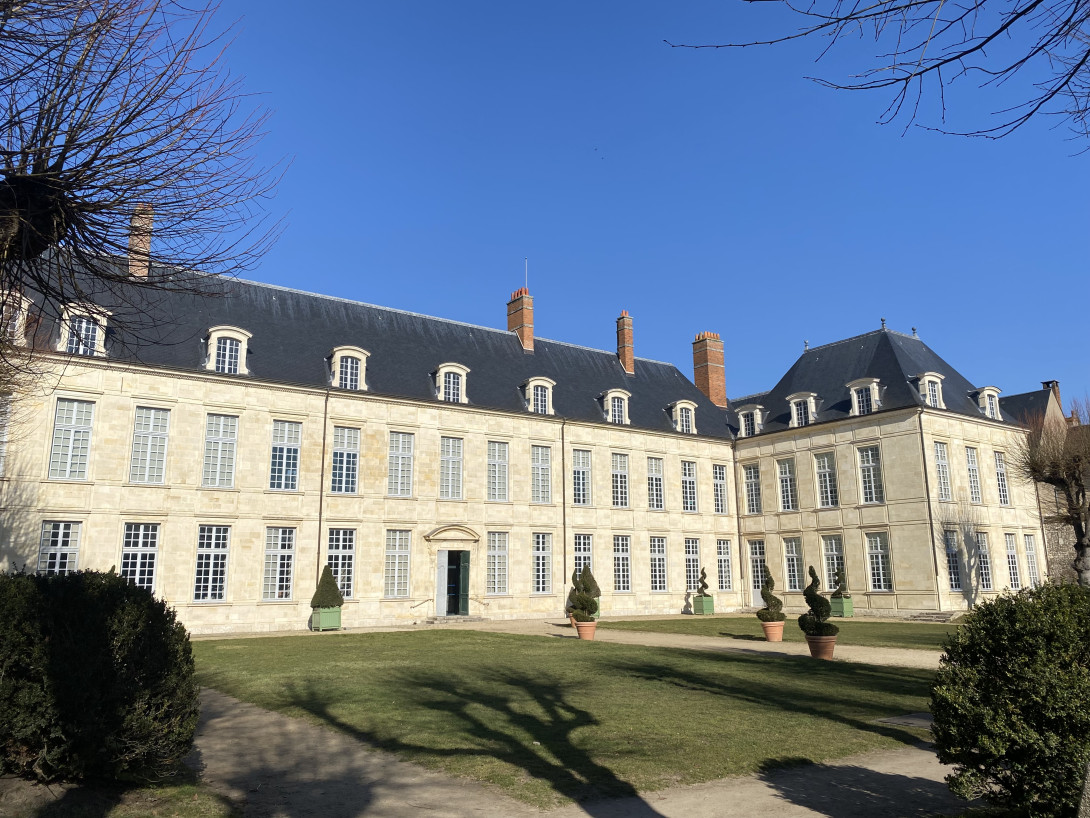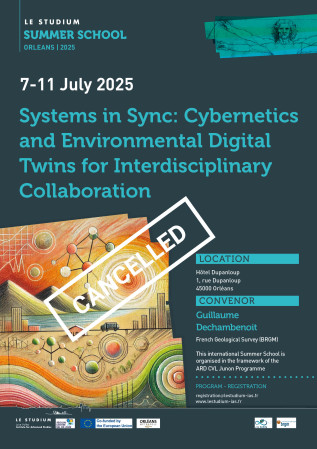Cybernetics and Environmental Digital Twins for Interdisciplinary Collaboration
Hôtel Dupanloup
1 rue Dupanloup
45000 Orleans
France
Presentation
** This event has been cancelled. Please contact Le Studium for more information. **
The "Systems in Sync: Cybernetics and Environmental Digital Twins for Interdisciplinary Collaboration" summer school is an innovative 5-day program at the intersection of engineering, information science, and human science. This immersive event aims to provide participants with both theoretical foundations and hands-on experience in designing and managing the technological and social systems that underpin environmental digital twin projects.
Cybernetics, as the science of systems, feedback, and control, serves as the backbone of the program, with a unique approach that bridges technological infrastructures and human collaboration systems. Participants will explore first-order cybernetics to understand technological feedback loops, second-order cybernetics for managing interdisciplinary and stakeholder-driven projects, and third-order cybernetics to assess user interaction and ecological impacts.
Designed to be accessible to non-specialists while offering depth for experienced researchers, the summer school combines expert-led sessions on cybernetic principles with project-based learning. The practical component emphasizes mapping multidimensional interactions between technology and society using a light version of Business Process Model and Notation (BPMN) and specialized software. By the end of the program, participants will have developed comprehensive models integrating both the precision of digital twins and the adaptability of social systems.
This summer school offers an unparalleled opportunity for academics and professionals to engage with cutting-edge concepts and tools for real-world applications. Whether you are a scientist, engineer, or policy-maker, this event provides a collaborative and interdisciplinary platform to address the challenges of sustainable digital twin implementation.
This international Summer School is organised in the framework of the ARD CVL Junon Programme.
CONVENOR
Guillaume Dechambenoit
French Geological Survey (BRGM)
Speakers
Thomas Biedermann, Australian National University - School of Cybernetics - AU
Thomas Fisher, Sustech School of Design - CN
Zhiqiang Gao, Cleveland State University - USA
Michael Lissack, Tongji University College of Design and Innovation - USA
Programme at a Glance
This five-day summer school provides a comprehensive interdisciplinary journey into environmental digital twins through the lens of cybernetics, combining theoretical foundations with hands-on project work to foster collaboration between diverse fields.
Pedagogical Goals
- Build a strong understanding of cybernetic principles (first to third order) and their practical application in environmental digital twins
- Develop skills in interdisciplinary collaboration through hands-on project work, process mapping, and stakeholder integration
- Foster critical thinking about ethical considerations and responsible implementation of AI-powered environmental monitoring systems
- Establish a collective vision and replicable methodology for conceiving environmental digital twins, including system blueprints and best practices
Target Audience
While primarily designed for lead project managers and engineers, this summer school welcomes researchers, and professionals from various fields who share an interest in environmental digital twins and cybernetics. No specific prerequisites are required, making it accessible to participants with diverse backgrounds who wish to expand their knowledge in this field.
Day to day program.
Day 1: Foundations – First-Order Cybernetics and Digital Twin Basics
- Early Morning: "Introduction to Digital Twins: From Industrial to Environmental Applications" (TBA) - Overview of digital twin evolution, from their industrial origins to modern environmental applications. Students will explore how this technology has adapted from manufacturing to ecosystem monitoring, setting the foundation for understanding environmental digital twins before diving into cybernetics.
- Morning: "Historical Foundations of first order Cybernetics" (Prof. Zhiqiang Gao) - Overview of cybernetics history from Norbert Wiener to modern incarnations. Students discover key figures and concepts, the co-evolution of control theory and practice, and the transition from stagnation to breakthrough, from PID to ADRC. State and disturbance observers: a special kind of digital twins widely used in engineering cybernetics.
- Early Afternoon: "Cybernetics I: the Science of Feedback Control in Engineered and Environmental Systems" (Prof. Zhiqiang Gao) - Core concepts and examples of first-order cybernetic systems and digital twins. Circular causality in feedback systems and the unavoidable thresholds beyond which there is no recovery. Self-correcting temperature regulation: the notion of stability, controllability, and robustness in the context of Chernobyl nuclear plant and Earth climate.
- Mid-afternoon: "Designing a Digital Twin: Principles & Context" (Prof. Thomas Fischer) - Focus on design principles and context for digital twins. Students explore user-centered design and systems thinking approaches for effective twin implementation.
Day 2: Broadening Perspectives – Second-Order Cybernetics, Stakeholders & Process Mapping
- Morning: "Cybernetics II: The Human in the Loop" (Dr. Thomas Biedermann) - Deep dive into second-order cybernetics and stakeholder involvement. Students learn how observers and users become part of the system they're designing.
- Midday: "Process Theory and Mapping Complex Workflows" (Dechambenoit Guillaume) - Introduction to BPMN and process mapping techniques. Students learn to diagram how information and decisions flow in socio-technical systems.
- Afternoon: "Light BPMN Workshop" (Led by Dechambenoit Guillaume) - Practical application of process mapping to team projects. Teams create process diagrams for their digital twin scenarios with mentor guidance.
Day 3: Expansion – Third-Order Cybernetics and Organizational Learning
- Morning: "Cybernetics III: Organizations as Learning Systems" (Prof. Michael Lissack) - Introduction to third-order cybernetics and organizational adaptation. Students explore how systems and stakeholders learn and evolve over time.
- Midday: "Case Study and Discussion" (Dr. Thomas Biedermann & Prof. Thomas Fischer) - Analysis of real-world digital twin evolution cases. Teams examine how environmental digital twins adapt and grow within organizations.
- Afternoon: "Integrating and Adapting: Project Development Lab" (All mentors) - Guided team work incorporating third-order concepts. Teams develop governance and evolution plans for their digital twins.
Day 4: AI, Interdisciplinary Integration & Ethics
- Morning: "AI and Environmental Digital Twins" (Joint lecture by Prof. Zhiqiang Gao & Prof. Thomas Fischer) - Exploration of AI's dual impact on system automation and user interaction. Discussion of machine learning applications in environmental modeling and the transformation of user experiences through AI integration.
- Midday: "Responsible AI and Avoiding Sloppy Science" (Joint lecture by Michael Lissack & Brenden Meagher) - Critical examination of ethical considerations and methodological rigor in AI-powered digital twins. Focus on responsible development practices and scientific validity.
- Early Afternoon: "Systems in Sync Panel" (All speakers) - Round table discussion connecting cybernetics, AI, design, and ethics perspectives. Interactive dialogue on creating balanced and responsible environmental digital twins.
- Late Afternoon: "Project Finalization and Ethical Review" (All mentors) - Teams incorporate AI considerations and ethical guidelines into their projects. Final preparation for Day 5 presentations with mentor support.
Day 5: Culmination – Student Presentations and Synthesis of Learnings
- Morning: "Team Project Presentations" (Expert Panel) - Teams present their environmental digital twin proposals. Expert panel provides feedback and facilitates discussion of interdisciplinary aspects.
- Midday : "Reflection and Future Directions" (Led by the program) - Synthesis of week's learnings and discussion of future applications. Program concludes with expert insights and opportunities for continued collaboration.
Location
Hôtel Dupanloup : 1, rue Dupanloup - 45000 ORLEANS - FR
The conference venue is unique. Located right next to the Orléans’ cathedral, the episcopal palace of Orléans, built between 1635 and 1641, locally known as the Hôtel Dupanloup, is a classical French building which served until 1905 of residence to the bishops of Orléans. Since 2014, the renewed palace hosts the International University Center for Research and Le Studium Loire Valley Institute for Advanced Studies.
Participants will be welcomed in this exceptional surrounding, blending Middle Age and Renaissance cultures with modern design and will have the opportunity to discover French cuisine and wines.
General Information
| Summer School Venue |
Hôtel Dupanloup, 1 rue Dupanloup
45000 Orléans, France
| Dates |
Monday 7 July to Friday 11 July 2025
| Language |
The official language of the Summer School is English
| Welcome pack and Name Badge |
Upon arrival you will receive a welcome pack that includes the printed material of the Summer School and your name badge will be given to you at the reception . Please wear your name badge at all times during the Summer School and to all official Conference events.
| Invitation Letters |
An official letter of invitation facilitating the obtention of an entry visa can be sent upon request . In order to receive an invitation letter for visa purposes, send an email to maurine.villiers@lestudium-ias.fr. Please note that :
- we only issue an official letter once the payment of the registration fee has been validated.
- such letters do not represent a commitment on the part of the Organisers to provide any financial assistance.
| Certificate of attendance |
After the summer school, in order to receive a certficate of participation, send an email to maurine.villiers@lestudium-ias.fr
| Hotels |
List of recommended Hotels in Orléans
| Restaurant |
How to get there ?
| By train: |
* Orléans centre station
1.5 hour trip from Paris (Austerlitz)
* Les Aubrais station (4km from Orleans town centre)
Tramway A, 10 minutes trip to Orléans centre station
> Plan your trip by train: https://www.sncf-connect.com/en-en/
| By car: |
GPS: 47.90243, 1.91179
Please note that you can't park in the courtyard in front of the Hotel Dupanloup.
Paid car parks nearby :
Parking Cathédrale, Rue Saint-Pierre Lentin, 45000 Orléans
Parking Hôtel de Ville, 4 Rue Fernand Rabier, 45000 Orléans
| By plane: |
*Arrival at Roissy Charles De Gaulle (CDG) airport:
Take RER B in direction to Saint Rémy Les Chevreuse, step out at Gare du Nord Stop
Take Metro 5 in direction to Place d'Italie, step out at Gare d'Austerlitz Stop
> Then take a train to Orléans (see "by train" section above)
*Arrival at Paris-Orly (ORY) airport:
Take Metro 14 in direction to Saint-Denis - Pleyel, step out at Bibliothèque-François Mitterrand Stop.
Take RER C in direction to Gare de Pontoise, step out at Gare d'Austerlitz Stop
Step out at Gare d'Austerlitz Stop
> Then take a train to Orléans (see "by train" section above)










